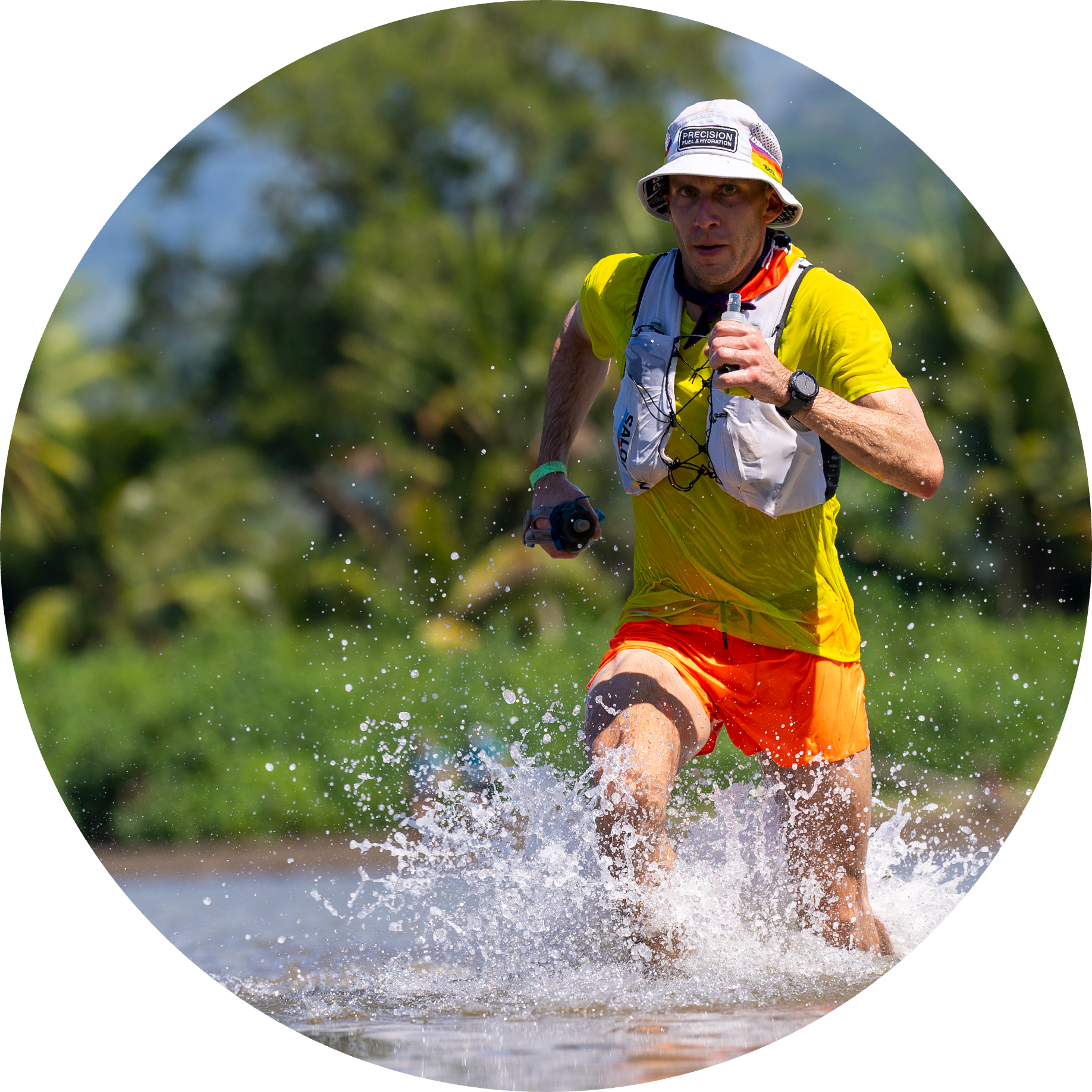
Pierre's headline numbers
Pierre's strategy
Fueling
Carbohydrate is the main fuel you burn when racing. Failing to fuel properly is a leading cause of underperformance in longer races.
Pierre took on this six-day epic challenge with his mind set on a first place finish. Unfortunately, he rolled his ankle on day two, which quashed his hopes, but he soldiered on to eventually finish in 7th. It turned out that crossing the finish line at all was a valiant effort, given the results of his MRI scan which revealed he’d actually fractured his ankle before running on it for another 29 cumulative hours.
When an athlete builds up a significant level of dehydration in hot and humid environments like in Costa Rica, the gut can become less efficient at absorbing fuel. The fact that Pierre didn’t experience any gastrointestinal discomfort throughout the entirety of this race, despite significantly under-drinking relative to his very high sweat losses, is a testament to his well thought out fueling strategy and significant gut training beforehand.
Hydration
Taking on board an appropriate amount of fluid and sodium is essential to maintaining blood volume and supporting the cardiovascular effort needed to perform on race day.
Whilst the absolute amount of sodium and fluid consumed per hour is important, it’s critical to consider these in relation to each other. This is known as 'relative sodium concentration' and it’s expressed in milligrams per litre (mg/L). How much sodium you’re taking in per litre of fluid is more important than the absolute amount taken in per hour.
Sweat sodium concentration (mg/L) is largely genetically determined and remains relatively stable. Knowing how salty your sweat is enables you to replace a good proportion of your sweat losses, which can range from 200-2,000mg/L.
Whilst Pierre’s losses are on the moderate side, getting his hydration strategy right is still crucial when it’s hot and/or humid as his higher sweat rate in these conditions can result in significant net losses over the duration of a race.
Learn morePierre has a lot of experience with racing events in the heat, including as part of the winning Marathon Des Sables team in 2023. He knew before this event that his sweat rate can be up to 2.5L per hour in very hot and humid conditions, meaning his hydration strategy would be very important. Pierre’s injury early on in the race meant he was exposed to the heat and humidity for much longer than he had originally anticipated, producing more sweat to cool his body down and accumulating a greater level of fluid deficit than his strategy accounted for. Ultimately, this meant he likely experienced dehydration beyond the scientifically accepted threshold for performance decline of ~2-4% body weight loss. Later in the week, Pierre had spent so much additional time out on course, he actually ran out of the hydration supplies he brought with him so had to rely on aid stations. Because of this he significantly under-replaced sodium relative to his sweat losses on the final day.
Caffeine
Beyond the Three Levers of Performance (carb, sodium and fluid), caffeine is one of only a few substances that is proven to improve performance for most endurance athletes as it can help stave off mental and physical fatigue.
Pierre chose to not use caffeine as an ergogenic aid for this event. He tends to utilise it for shorter events like the Valencia Marathon where he could really feel the immediate performance boost, rather than drip feeding it into his longer days on the trails. Many ultra runners do use caffeine as a way of reducing their perceived exertion and increasing focus when they’ve accumulated a lot of mental fatigue, so it may be worth introducing for his next event, especially in the latter days.
How Pierre hit his numbers
Here's everything that Pierre ate and drank on the day...
Pierre's weapons of choice
Final thoughts
Pierre's full stats
Data Confidence?
There is low confidence in the accuracy of the numbers reported. The intake reflects a rough guide to what an athlete consumed but quantities volumes or specific brands might be unknown. It is a loose insight into what the athlete did but the room for error is high-to-very high. This level of confidence most likely reflects the nature of the event (for example an ultramarathon 24 hour or multi-stage event).